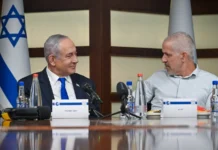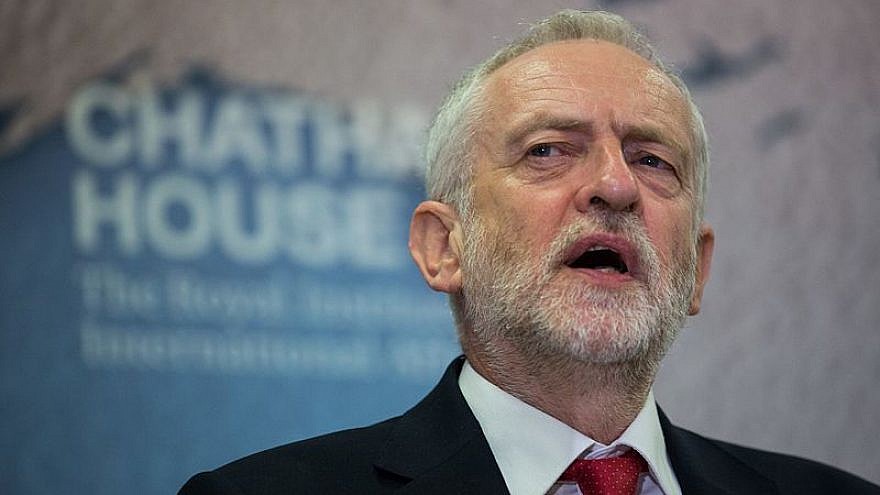The “it’s” I refer to is a phenomenon pretty much unknown to newer generations of Jews in terms of their direct experience, but it will be remembered clearly by folks who lived through the Cold War—and particularly those Jews, in the United States and around the world, who campaigned for their brethren imprisoned in the Soviet Union.
Some people find it hard to compute that the same USSR whose Red Army liberated Auschwitz in 1945 also practiced anti-Semitic policies using the official classification of Jews as a “constituent nationality” to then discriminate against them in employment, education and emigration rights, to harass them in their observance of the Jewish religion and to conduct a mass propaganda campaign against “Zionists.”Soviet anti-Semitism—a form of Jew-hatred whose distinctive characteristics mark it out from other forms of anti-Semitism—was state policy in the USSR, arguably from the 1917 Bolshevik Revolution onwards, but indubitably so in the post-World War II period
By the same token, it’s hard for people to understand how Britain’s Labour Party—many of whose activists and leaders fought against British fascism in the 1930s—has now itself become immersed in anti-Semitism under a leader, Jeremy Corbyn, who has spent the greater proportion of his political career using the word “Zionist” as a pejorative, rather as the USSR’s official mouthpieces used to do.
Sadly, just as Nazi anti-Semitism didn’t quite die out after the war, Soviet anti-Semitism has survived the rubble of the Berlin Wall. So it is perhaps fitting that it should re-emerge in the pages of a newspaper that bewailed the fall of that very same wall, and the attendant collapse of Communist Party tyranny, as a tragedy of world-historic proportions.
For much of its existence, The Morning Star, Britain’s Communist newspaper, was a slave of the Soviet Union. Old habits die hard, it seems—an editorial in the paper this week that attacked the “Jewish establishment” for allegedly scheming to bring down Corbyn was horribly reminiscent of the kind of screed about “Zionists” that was once daily fodder in the Soviet press.
Here is a flavor of what was said, and how it was expressed. To start with, the phrase “the Jewish community” was published with quotation marks around it, intimating that, in contrast to other communities in Britain, it is somehow artificial or inorganic. This was done to underscore that the British Jewish communal bodies subsequently listed in the piece—from the Board of Deputies to Labour Friends of Israel—are actually unrepresentative, corrupt agencies that function as a “pro-Israel Lobby … more concerned with silencing critics of Israel than combating anti-Semitism.”
The article went on to charge Margaret Hodge, a Jewish Labour parliamentarian and staunch opponent of Corbyn, with “belittling” her own father’s experiences as a refugee from the Nazis; quoted a Jewish left-winger who ventured in all seriousness that Britain’s Jewish leaders are committed to “censorship and outlawing views other than their own;” and warned that even if Labour adopted the IHRA definition of anti-Semitism without qualification—the source of the present row—the relentless campaign against Corbyn would continue.
“Labour’s enemies, including its most embittered fifth column, have tasted blood,”” the article concluded, “and won’t end their attacks until Corbyn is hung out to dry.”
How do these accusations and denunciations resemble Soviet anti-Semitism? To take one example, in January 1977, Soviet TV broadcast a “documentary” titled “Traders of Souls.” In that one hour-film, noted the American scholar William Korey, “the image of the Jew as money-changer ran throughout … he is the ‘trader of souls.’ ”
Korey carried on describing the film as follows: “Television footage of Israel portrayed scenes of battlefields strewn with hideously misshapen corpses and bandaged Arab children. … Soviet Jewish activists were shown embracing Israeli athletes while the commentator asked: ‘How can it be that Zionist cadres were allowed to form inside the USSR?’ ” The broadcast was followed by a slew of newspaper articles with headlines like “The Espionage Octopus of Zionism,” replete with wild claims that will probably be familiar to many British Labour Party social-media activists—for example, that U.S. oil companies “are directly controlled by pro-Zionist capital.”
Most of all, there was the Soviet practice of wheeling out “citizens of Jewish nationality” to denounce Zionism as a “racist” tool of “imperialism.” In March 1983, the Soviet news agency TASS even published a definition of Zionism drawn up by the state-run “Jewish Anti-Zionist Committee” that read as follows:
“In its essence, Zionism is a concentration of extreme nationalism, chauvinism and racial intolerance, justification of territorial seizure and annexation, armed adventurism, a cult of political arbitrariness and impunity, demagogy and ideological sabotage, sordid maneuvers and perfidy.”
To my mind, the most obvious question here to Jeremy Corbyn, theMorning Star and those of a similar pedigree, is this: Is there anything in this Soviet definition of Zionism that you disagree with? Make no mistake, the answer is critically important, because it is exactly this characterization of Zionism that grounded both the USSR’s domestic persecution of its Jewish community, and its international alignment with Arab regimes and terrorist groups.
If the answer is to disagree with this formulation—highly unlikely, given that Corbyn himself was present at dozens of left-wing political gatherings during the 1970s and ’80s where Soviet and Arab anti-Semitic literature was distributed—then it is a disingenuous one. Because when Corbyn and those in his camp speak and write about the triangle of Jews, Zionism and Israel, these are the terms in which they think, and have always thought.
That is why Corbyn’s house journal uses terms like “embittered fifth column” to describe their leader’s Jewish opponents—also used by Valery Emelyanov, an official Soviet ideologue, in 1978 to describe the “internal danger” posed by Soviet Jews. It’s why they have no qualms about saying that Jewish leaders opposed to Corbyn have “tasted blood,” despite the associations with the anti-Semitic blood libel that such a metaphor unleashes; then again, Vladimir Begun, a particularly toxic Soviet anti-Semite, wrote with great enthusiasm of the “bloodthirstiness” that was inherent in “Zionist gangsterism.”
Given the number of occasions that Corbyn publicly defended the Soviet regime—“The Soviet Union makes far greater nursery provision than this country” (1984), “I do not believe that [the USSR] has ever intended to invade western Europe” (1990)—he was clearly well aware of Moscow’s stance on all the key international matters of the time, as well as its propaganda practices. That doesn’t make him a spy, but it does make him an ideological fellow-traveler. And as the Morning Star has demonstrated by defending Corbyn with an ugly rhetorical assault on British Jews, that Soviet-inspired journey rolls on.


























